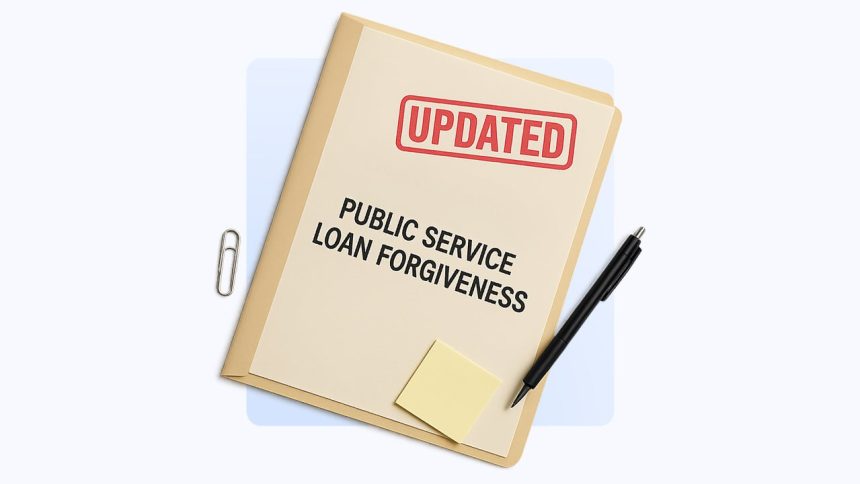Colleen Campell, a former executive director at the Department of Education’s Federal Student Aid office, questions why Public Service Loan Forgiveness (PSLF) is seemingly always in the spotlight.
“PSLF is 2 million borrowers and there are 43 million student loan borrowers,” says Campbell, who received PSLF relief for some of her own education debt. “And so, while it is an extreme [and] it would be devastating to have the rug pulled out from borrowers who are pursuing PSLF, overall, when we’re thinking about the scope of the federal student loan portfolio, PSLF is really a non-factor for most borrowers.”
And yet, the embattled program has become a lightning rod for the Trump Administration’s ire. It has sucked much of the oxygen out of the broader student loan conversation, but it’s also a microcosm of a system that’s fundamentally broken.
And PSLF, like the rest of the student loan system, is sure to change, at least if the White House has its way.
The Trump Administration’s attack on PSLF
When observers wondered whether education debt forgiveness was possible under Trump, leading student loans expert Mark Kantrowitz reminded us that the president tried to repeal PSLF (unsuccessfully) during his first term. The commander-in-chief has only continued those efforts since re-entering office in 2025.
Part of why the Trump Administration has tested each legal route is to head off any potential challenges. The future-proof route would have been via the Big Beautiful Bill, but the Senate Parliamentarian very likely wouldn’t have allowed Congress to fully dismantle PSLF as part of the budget reconciliation process, even if it had tried. (The Senate even did away with preventing doctors and dentists from counting residencies toward PSLF, which was in an earlier House version of the bill.)
Negotiated rulemaking, a laborious process government departments use when reshaping policy that ostensibly considers opposing opinions, is the next best thing. As the Education Department admitted in its July 2 release, its appointed committee didn’t reach the consensus necessary to fast-track the rewriting of employer eligibility for PSLF. The lone dissenter, The Institute of Student Loan Advisors president Betsy Mayotte, told USA Today that she wasn’t convinced the Department had the legal authority to cherry-pick which employers qualify and which don’t.
Experts have said the Department will write its own eligibility revisions soon enough — you’ll be able to make comments during a specified window after the revisions are published in the Federal Register — but expect court challenges before anything is put in place in 2026.
What about making PSLF easier to achieve?
Of course, some ideas that didn’t make it into the Big Beautiful Bill could improve PSLF. Even A. Wayne Johnson, who served as the chief operating officer of Federal Student Aid during the first Trump Administration, has said relief could be awarded on an hourly basis in exchange for community service, not strictly after a decade of working for an eligible employer.
The consequences of a diminished PSLF
Chris Alvarez, an Arizona-based optometrist for the Indian Health Service, submitted his 120th and final payment toward PSLF on March 5. Four months later, he was still waiting for his remaining $143,000 balance to be wiped away.
Worried about a shrunken Education Department, Alvarez told Bankrate in June, “Hopefully, this updates as soon as possible, [then] the discharge process can officially begin.”
Unfortunately, the consequences of PSLF changes won’t just be felt among borrowers who have worked years for an eligible employer and made, or are in the process of making, their decade’s worth of qualifying payments.
It could also inhibit newly-indebted bachelor’s and graduate degree-holders from pursuing important but low-paying careers. Imagine considering public service — perhaps for the government or a nonprofit organization — without the potential reward of PSLF. Would you still accept a paltry wage for a difficult job, or would you be tempted by a better salary in the private sector that could help you pay off student loans faster?
Should you (continue to) pursue PSLF?
If you know your student loan legislation trivia, you’ll recall that President George W. Bush signed the PSLF into existence in 2007. The letter of the law says that government and 501(c)(3) employees are eligible to pursue this relief, regardless of their position, cause or political beliefs.
So, no, the era of student loan forgiveness isn’t over, even if it sometimes feels that way.
But if you have student loan debt to repay — or soon will — it’s wise to pay attention to the shrinking of the federal education debt safety net. Since the spring, the Education Department website has cautioned that, while it is reviewing the president’s March executive order, “There are no changes to PSLF currently, and borrowers do not need to take any action.”
But that implies you should sit still, which is rarely a good idea in the world of debt repayment. Instead, take this opportunity to reset.
|
If you’re considering PSLF… |
Keep in mind that the Trump Administration is targeting certain employers that have, to this point, been eligible for PSLF. If you don’t work in affected fields, you might feel like you’re in the clear. But also remember that PSLF doesn’t have a great track record of providing relief to those who follow the rules. So, it’s probably wise to only go into the public sector if you have other good reasons, such as a passion for the work itself. |
|
If you’re already pursuing PSLF… |
Again, if you work for an employer that’s not being targeted, you might just keep on keeping on. If your employer works on causes that the Trump Administration might be hostile to, on the other hand, keep your eyes peeled. Whatever the case, don’t fall victim to the sunk cost fallacy. Evaluate your repayment options, perhaps with the help of a student loan counselor, to determine whether PSLF is still your best path to a zero balance. |
In addition, examine all of your student loan forgiveness options, including PSLF, and don’t forget to also consider employer student loan repayment and organizations that offer assistance. Every little bit helps.
Why we ask for feedback
Your feedback helps us improve our content and services. It takes less than a minute to
complete.
Your responses are anonymous and will only be used for improving our website.
Help us improve our content
Read the full article here
















